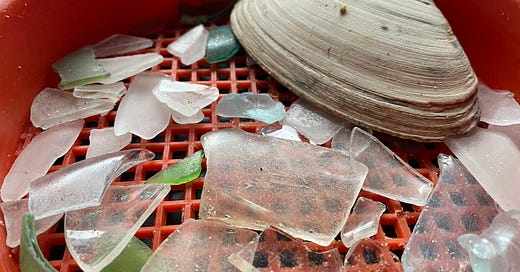A riddle, then:
Why, when once proud glassware slips, drops, shatters into bedazzling shards across kitchen floors, amidst screams and shouts and pirate words, do we make a mad dash for the broom closet—rightly fearful of bloody feet and asphyxiated cats—and fail to see the treasure?
Call it broken glass.
Why, when wandering along the seashore, waves yawning at our feet, sunlight redeeming tiny shimmers of broken things in its cheerful dance, do we run to scoop up small, rounded fragments of long-lost bottles, nothing more than pieces, hints, ideas of a past object and past hands that held—and dropped!—it, do we hold them to the sun’s glare and declare, treasure?
Call it sea glass.
An invitation to conjure up old sunken ships and their enchanted cargo of antique glassware, or a pair of grubby hands haphazardly holding a mason jar? Mystery or practicality or the unknown or the all-too-ordinary. Different origin stories with similar results.
Call it the looking glass.
In the end, shards of glass are shards of glass are shards of glass are shards of glass: broken fragments of something that was once beautiful, that cradled in its being the drink of the gods or the water of life or or or
But now shards of glass are shards of glass dusted with sand or dusted into the wastebin and the only real difference, the only missing element that turns the broken things into treasure is the slow caress of the sea—and, most essentially, time—that rounds the rough edges, that blunts that which is sharp and makes pearls worthy of little hands, the same hands from which the glass once slipped, dropped, shattered.
And maybe it’s not the sea, maybe it’s not the time, maybe it’s not the dance of the twilight upon fragments and figments but it is in fact those little hands that turn those shattered shards over and over and over again into treasure, sanctifying the pieces of the thing once dropped, bringing it all around again.
And another thing:
Over at Dork Side of the Force, I offer some thoughts in response to a common critique of new Star Wars stories, that they know longer clearly spell out good versus evil. I write: It's okay to want clarity, to want to know if we’ve acted for the greater good. But it’s necessary to live in reality, where the choices we make are often blurred by a complicated world. If Star Wars stories make us uncomfortable because they hold up a mirror to our own inner lives, then I’d contend they're doing their job—and doing it well. Check out the full essay here.
For IgnatianSpirituality.com this month, I shared an image from a retreat I went on long ago that has stayed with me and how the simplest moments can break open the mystical. Give it a read.
Finally, to round out my wannabe mystic energy, in this week’s Now Discern This I invite us to consider an obvious truth: The longer you sit in a place, the more it reveals itself to you. Check it out.




